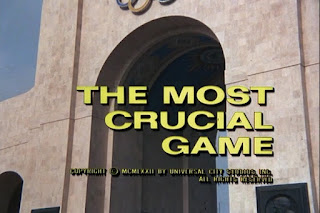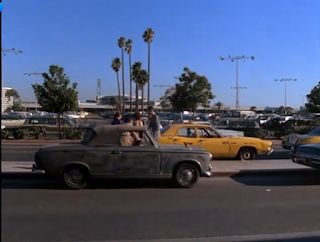- Get link
- X
- Other Apps
On November 5th, 1972 the 3rd episode of Columbo Season 2 went on the air for the first time.
This episode had a few of notable returners:
Robert Culp
Most significantly, Robert Culp returned as the murderer. Word is that Falk and the studio were so impressed with his work in Death Lends a Hand that they thought he'd be perfect to kill again, as Paul Hanlon the power-hungry general manager of the sports network.
James Gregory
If Coach Rizzo looked familiar that's because at the end of Season 1 Roddy McDowall blew him up in Short Fuse.
Marv Goux
Coach Rizzo's unnamed assistant coach in this episode is Marv Goux. He must like working for Robert Culp because in Death Lends a Hand Marv plays "Clean cut, ex-Marine type" detective Leo Gentry.
Wanna travel?
If so, Richard Stahl might be your man since he TWICE played travel agents on Columbo. First, he confirmed Paul Hanlon's travel plans in The Most Crucial Game then in season 3 he did the same for the doomed Karl Lessing's travel plans in Lovely But Lethal.Later in season 3 he once again foiled Robert Culp as a ballistics man in Double Exposure.
And one yet to come...Dean Stockwell
The victim in this episode is played by Dean Stockwell who, in season 4, will be the patsy that Robert Vaughn tries to frame for Rosanna Welles' murder in Troubled Waters.

What to watch for
A few things I found interesting in this episode.
A Super opening
Many of the opening scenes of the L.A. Coliseum are from Super Bowl I between the Chiefs and the Packers. You'll notice one of the endzones is painted "Chiefs" and you catch a couple of shots of the Chiefs cheerleaders.
The actual game footage is NOT the Super Bowl, however. The players in that game aren't wearing the right uniforms for either team; and the footage actually looks a bit older.
The actual game footage is NOT the Super Bowl, however. The players in that game aren't wearing the right uniforms for either team; and the footage actually looks a bit older.
What did she wear home?
When Paul calls Eric, the implication is that Eric had female companionship the night before, but she went home. There's lingerie and women's shoes on the floor of his bedroom. But if she left her underwear and shoes at Eric's house...did she go home half-naked and barefoot?
Key to Hanlon's alibi is that nobody can know he's not in the owner's box during the game. So he sends the box attendant off to take his girl to the movies and he calls Coach Rizzo before the game and is intentionally antagonistic. That ensures Rizzo will remember the call, and not want to talk to Hanlon before halftime.
You may recall that Alex Benedict does something similar to keep people from coming to his dressing room while he's off killing Jenifer Wells in Etude in Black.
Hanlon also insists Rizzo come up to the box at halftime - so Rizzo can confirm that he was there.
That's a risky move, by the way. You can't guarantee how long a half of football is going to take. If there's a lot of passing the first half could take longer. If there's a lot of running it could go faster.
It may be that this was a subtle reason why Hanlon badgers Rizzo about the game plan. Goading him into throwing the ball more so the half would last longer.
Split Right, 414 Flat Flare
While Hanlon is on the phone with Coach Rizzo, the assistant coach is talking over some plays with one of the players. As a former football coach myself I know that often any plays you may see drawn on screen in a TV show or movie are fake plays that some propmaster drew just to look good, and aren't real plays.
The assistant coach in the scene, Marv Goux, however, actually was an assistant football coach at USC for many years so it's a safe bet that the plays on the board are legit.
I'm guessing it was a deliberate ploy to make Hanlon seem less sympathetic but he exits the stadium to kill Wagner while the National Anthem is playing. Everybody else, including another Ding-a-Ling Ice Cream vendor, is standing with their hats off and hands over hearts...but Hanlon is striding away, hat on his head, indifferent to the playing of the anthem.
Especially in 1972 that would have been considered very rude.
"Mr., I want an ice cream!"
Hanlon stops at a phone booth on the way to Wagner's house. Key to setting up his alibi is to get a recording of him on the phone with Eric, apparently in the booth at the stadium, minutes before Wagner dies. As he drives away a little girl runs after him, thinking he's a real ice cream guy.
Hanlon pulls a big chunk of ice out of the truck to use as the murder weapon. That explains why the ice cream truck was necessary - it's a giant freezer on wheels and if he got stopped on the way to the crime the presence of a block of ice wouldn't raise any questions.
Then again, I have to wonder if he pre-staged the block of ice in the truck, or if blocks like that were common to those trucks.
The block if ice is a brilliant murder weapon, of course. It's going to melt away in the pool pretty quickly, there won't be any fingerprints on it, and it's untraceable.
Deja Vu All Over Again
If Eric Wagner's house looks familiar that's because before Eric moved in, it was where Ken Franklin lived in Murder by the Book.
"What did you pay for those shoes?"
At the crime scene Columbo steps in the pool, apparently unintentionally, getting his shoes wet. This led - in a subsequent scene - to a now-famous saying. When he meets the lawyer, Mr. Cunnell, at Wagner's house he asks him "How much did you pay for those shoes?"
Word is that Peter Falk may have ad-libbed that line, which would explain why Dean Jagger's halting, and seemingly authentic, response "Uh, I don't know, maybe $60?"
The line would become sort of a trademark of Columbo.
And speaking of stepping in the water, did you notice that in the next scene when Columbo has gone to the stadium to talk with Paul Hanlon, that when he gets off the elevator he still has his right pant leg rolled up...because his shoe got wet.
The Car
We see Columbo's trademark Peugeot several times in this episode. At the airport it's looking especially rough.
Who let the dogs out?
One of my favorite scenes in the episode is when Walter Dobbs - played by Columbo occasional Val Avery - breaks into Eric Wagner's house to retrieve his phone taps, only to be caught by Columbo.
But...while Dobbs is breaking in an unexplained dog trots into the scene. Avery doesn't break character, and even pauses to pet the dog. I have to wonder if it was a crew member's dog (or maybe Peter Falk's) who got loose and decided to get into the scene.
Culp is good, when he's caught
One thing I've noticed about Culp is that he's one of the best Columbo villians with his reaction when he gets caught.
Just a few more things...
- Interesting to see Paul Hanlon just strolling in one of the regular stadium entrances with the fans. You wouldn't see that today with a modern general manager, I suspect. They all have private elevators from their reserved parking spots.
- There's a scene at a basketball gym where Columbo goes to tell Hanlon about the phone taps. That was an elaborate set-up to get some NBA players on the screen; the NBA wanted to get the players into more TV shows for publicity.
Plot holes
Concerns I have with the story...
Unnecessary cover-up
Stepping back from the killing Hanlon notices he's left wet footprints ont he pool deck and he pulls out a garden hose to rinse them away. That seems pretty unnecessary to me since wet footprints on a pool deck generally evaporate in the Southern California sun in a matter of minutes.
But the fresh water from the garden hose was a necessary plot device to tip Columbo off that there might have been foul play.
The motive...
The motive in this one is pretty weak. Wagner threatens to fire Hanlon at one point but the plot is already underway and it felt like an empty threat. It seemed like Wagner already let Hanlon pretty much run everything so it's not clear what Hanlon got out of Wagner's death.












Comments
Post a Comment